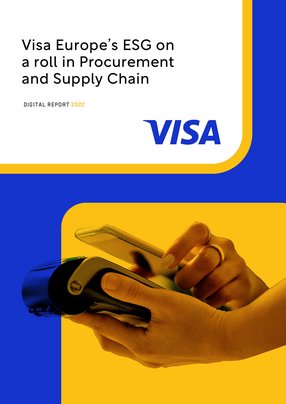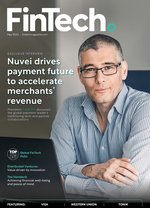Visa Europe’s ESG on a roll in Procurement and Supply Chain
The Chief Procurement Officer’s engagement with the C-Suite is growing, and increasingly Chief Financial Officers recognise the value that a close relationship between the two executive functions can bring to the business and its commercial goals.
“Over the past two years of the pandemic, we've had the opportunity to take a closer look at the resilience of our supply chain and how closely connected that supply chain is with the communities where we are,” says Rob Livingston, Visa Europe CFO.
“During that time, there have been two elements that have leapt to the forefront in terms of how we think about procurement. The first one is around sustainability and making sure that we have a supply chain that is going to reflect our goals as a corporation in terms of our environmental and other impacts on society.
“The other element that we really focused on is the diversity of our supply chain – making sure that we were resilient and support diverse and small businesses. Having backup suppliers for the most critical functions is key, as is thinking about diversity in terms of ensuring that we're supporting businesses that are owned by women, or led by women, and minority-owned businesses here in Europe and around the world.
“This work is central to our purpose – everyone deserves an equal chance at economic prosperity.”
Livingston joined Visa in 2013 to lead Visa’s Canadian business before then moving to China in 2017. He became Visa Europe’s CFO in July 2019 so the majority of his tenure in this role has been set against the backdrop of the pandemic – which has transformed the nature of payments and procurement.
“We were looking to bring procurement more to the centre of our business strategy,” says Livingston.
“So I was thrilled to be able to hire Alisa Bornstein to join Visa Europe as our Chief Procurement Officer. She's got a fantastic background and a deep knowledge of procurement.”
Bornstein made a name for herself in procurement while CPO of UK semiconductor and smart technology design company, Arm, based in Cambridge, England. While at Arm, Bornstein designed and executed a procurement transformation, from maturing the function to digitising and automating end-to-end source-to-pay (S2P) processes.
Bornstein joined Visa Europe in January 2021 and has been tasked with elevating procurement in line with leading practices and standards, including state-of-the-art business support. She embarked on a transformation of the function, and continues to advocate the importance of the procurement and supply chain as a strategic part of the business ecosystem.
“This is not about having a seat at the table,” says Bornstein, “but to ensure that we, as procurement professionals, listen, understand and support the business and use the power of the supply chain to deliver value to our organisations. True procurement leaders have shifted from being operational in the past to becoming strategic business partners. Collaboration and partnership is my passion. This is something I believe in, and this is what we have at Visa.”
THE IMPORTANCE OF THIRD-PARTY SUPPLIERS
Going back to sustainability and diversity, they are key drivers of the changes being seen in procurement at Visa Europe, and Bornstein says these are big opportunities for many organisations who haven’t yet leveraged their supply chain.
Visa Europe has literally thousands of suppliers and one key area of focus for Bornstein is to better understand the third-party suppliers’ ESG credentials to support company-wide objectives and initiatives.
“Procurement can drive innovation by utilising suppliers’ knowledge in their own space,” says Bornstein. “It's very well positioned to drive ESG, sustainability and diversity. Visa recognises that third-party suppliers are important stakeholders.
“Today they provide services and products to us, tomorrow they might become our partners and ultimately, as both businesses and individuals, they use our payment solutions.”
To support Visa Europe in its ESG initiatives, the Procurement team has entered into a partnership with EcoVadis to help assess their supply chain. The aim is to provide a better understanding of suppliers: who they engage in their business from an ESG perspective, and how Visa can together improve the communities in which they operate.
That partnership with EcoVadis helps to provide insights into Visa’s supplier base, which is more important than ever when it comes to risk mitigation – something demonstrated by the pandemic. However, this spotlight on suppliers goes beyond highlighting potential problems – it has benefits for the suppliers too, with Visa being able to identify those that may need extra assistance or support in these unprecedented times.
“We are focusing on sustainability and diversity in our supply chain,” says Bornstein. “That's our highest priority. Working with and supporting small businesses is extremely important to Visa Europe and Visa overall, and procurement as a function has a role to play.”
One example of that supportive role is the aspiration to operate in line with the UK Government Prompt Payment code and change SME payment terms to 30 days, to help small companies through tough times and recognise their importance to Visa Europe.
“The pandemic has been incredibly tough on small businesses more than anyone else,” adds Livingston. “What we are trying to do at Visa is to support small businesses as they recover from the pandemic and then accelerate their business in the future, and the main way we can help them do that is by helping them go digital.
“Even today, less than half of small businesses in Europe have a digital presence for ecommerce, and that's something that creates tremendous opportunity for a rebound in the future. We've made a multi-year commitment to digitise 50 million small and medium businesses around the world and we're already halfway there.”
Visa is able to implement this far-reaching initiative by combining its global strength coupled with local knowledge. Operating in more than 200 countries gives Visa unique insight into what’s important to clients, consumers and merchants in each of those locations.
Visa’s sustainability ambitions go far beyond supporting SMEs and promoting ecommerce.
“Visa as a company is committed to achieving net-zero carbon emissions by 2040, which is 10 years faster than the Paris Agreement,” says Livingston.
“The way that we're doing that is the way that all companies do – through offsets and changing behaviour of our employees and our suppliers. But at Visa we can also provide sustainable products and solutions that our clients’ banks can offer consumers to help them manage their carbon footprint. This has incredible power over the long term.”
THE FUTURE OF DIGITAL PAYMENTS
The payments ecosystem witnessed an acceleration in digital transformation during the pandemic, and it is important for Visa to maintain some of the benefits for the future – from contactless payments to online shopping – while also making preparations for the global recovery.
“We're just at the beginning of cross border travel starting to come back,” says Livingston. “People are feeling confident enough to go overseas on holidays, and those are all good for the global economy and they're good for Visa.
“The speed of that return of business as usual is going to be important, but we can't lose sight of the fact that so much has changed.”
When you accept payments in more than 80 million locations, and process thousands of secure transactions every second, everybody knows your name – but does everyone fully appreciate what Visa does?
“This is what we bring to the table,” says Livingston. “We are a global brand operating locally. We're one of the most ubiquitous brands in the world, but not everybody knows exactly what we do. What Visa does is facilitate commerce each and every day, all around the world.
“We enable consumers to buy things in person at stores or online, and we facilitate money transfer from businesses to businesses, from banks to banks.
“People trust Visa because of what we bring to the global economy. We offer extraordinarily fast and secure transactions for everyday use and we have the world’s leading security infrastructure governing digital payments.
“There's nothing more important to us than ensuring that Europeans are able to use their card anytime and everywhere they want to be.”



